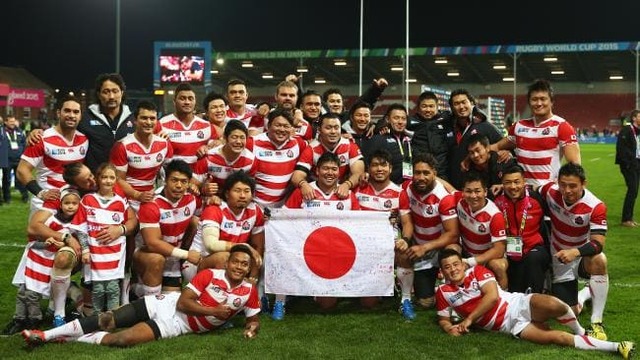Can Japan shock the world again?
The wait is almost over. The world’s best are set to gather in Japan ahead of the latest battle for sport’s biggest prize and what looks like one of the most competitive tournaments ever.
Japan have arguably already won having previously secured the right to stage the first Rugby World Cup in Asia and the first outside one of rugby union’s traditional major powers.
But that historic announcement was ten years ago and the ensuing decade has seen excitement build, anticipation intensify and expectation rise.
The most significant step on that journey came four years ago in England when the Brave Blossoms conjured the greatest ever World Cup shock – a 34-32 injury-time victory over South Africa.
The heroics of Eddie Jones’ side did not end that day with further wins against Samoa and USA taking them to the brink of quarter-final qualification for the first time.
The fact that they were the first side to win three of four pool games and yet fail to progress will only have further fuelled their determination to make history in front of their own fans this time around.
The coaching reins have since passed to Jamie Joseph – ably assisted by Tony Brown – and a place among the elite in the quarter-finals is their target.
“The team has set a goal of making the top eight for the first time in the history of Japanese rugby,” Joseph told reporters as he announced his squad for the tournament.
Only one host nation has failed to reach the knock-out stages of the tournament – England crashing out of the 2015 tournament and making history for all the wrong reasons.
Japan certainly appear on course for a strong showing with recent Pacific Nations Cup victories over Fiji, Tonga and United States lifting them to a record-equalling 9th place in the World Rugby rankings.
The last time they hit those heights was back in 2016 in the wake of their last World Cup campaign.
Another upset will be required if they are to make the quarter-finals with Six Nations giants Ireland and Scotland clearly favoured to progress from a pool that also includes Russia and Samoa.
But again, there is reason for hope.
Victory over Italy last summer, a draw with France in 2017 and narrow defeats to Wales and Scotland two years ago indicate that this generation can certainly worry the headline acts.
The trouble is that they themselves would also now represent a significant scalp to those attempting to follow in their boot prints and there is no danger of their more significant rivals taking them lightly.
The weight of expectation will also increase the pressure but don’t expect them to stray too far from their usual all-action and crowd-pleasing approach to the game.
“The staff and players will give 150 percent — whether that’s enough only time will tell,” said Joseph.
“Our game is based around speed, skill and unstructured but the key difference this year is we are fit enough now to play that game.”
That reliance on guts and guile in the absence of raw power helped Jones out-coach many four years ago but you sense Joseph needs to finds something else and he thinks he has.
“We’re training at a level of intensity that’s 25 percent higher than our matches — I think that’s our key weapon,” he revealed.
It is a training method also favoured by Jones, now plotting England’s World Cup assault on the other side of the globe, where Joseph and Brown were recently invited to observe the operation.
Fitness was not necessarily the downfall of Jones’ side four years ago with a brutal schedule laid down by World Rugby forcing his charges to tackle Scotland in a crucial encounter just four days after their memorable success over the Springboks in Brighton.
In total, they faced four games in just 23 days – this time around they face a similar schedule but an eight-day preparation window for what is set to be another pivotal clash with Scotland.
They may not be short of enthusiasm or stamina but could experience be their downfall in what is sure to be a pressure-cooker of an atmosphere?
The hugely-influential Michael Leitch has won his fitness battle to lead Japan into the tournament but he will spearhead a squad containing just 10 players with previous World Cup experience while a similar number have just single-digit Test careers.
As a result, a lot will be expected of the likes of lock Luke Thompson, who will be lining up in his fourth World Cup, and back-row Leitch, scrum-half Fumiaki Tanaka and hooker Shota Horie who will be gracing the sport’s biggest stage for the third time.
Perhaps the clearest indication as to whether they are poised to shock the world once again will come in their final warm-up clash.
The game against South Africa on the eve of the tournament – their first meeting since 2015 – will offer them the opportunity to light the fuse on what could be a spectacular tournament.
Boks coach Rassie Erasmus is understandably wary of an ‘ambush’ that could derail his own side’s preparations.
Japan’s fortunes will not define the success of this World Cup with only a limited amount of the 1.8m tickets issued still available.
In addition, 400,000 fans are expected to visit the country and boost the local economy in the coming weeks in a further testament to the work done to market the tournament in a ‘new’ market.
But if the tournament is to really make another indelible mark on sporting history it needs a significant twist in the tale and just maybe Japan can deliver once again.


